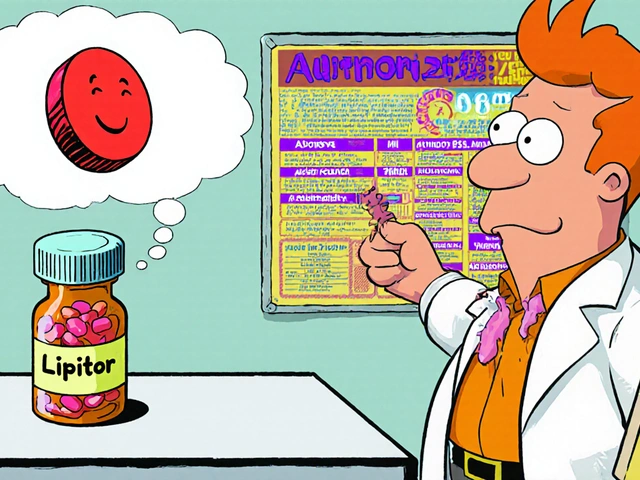Understanding Premenstrual Dysphoric Disorder and Irritable Bowel Syndrome
Before diving into the connection between Premenstrual Dysphoric Disorder (PMDD) and Irritable Bowel Syndrome (IBS), it is essential to have a basic understanding of these two conditions. PMDD is a severe form of premenstrual syndrome that affects around 5-8% of women. It is characterized by mood swings, irritability, depression, anxiety, and physical symptoms such as bloating and breast tenderness. These symptoms usually occur during the week or two before menstruation and can significantly impact a woman's quality of life.
On the other hand, Irritable Bowel Syndrome is a common gastrointestinal disorder that affects approximately 10-15% of the population. IBS is characterized by abdominal pain, bloating, diarrhea, and constipation. The exact cause of IBS remains unknown, but it is believed to be the result of a combination of factors, including changes in gut motility, increased gut sensitivity, and alterations in gut bacteria.
Exploring the Link Between PMDD and IBS
Several studies have shown a connection between PMDD and IBS, with women who suffer from one condition being more likely to develop the other. This connection is believed to be due to the complex interplay between hormones, the nervous system, and the gastrointestinal system.
One possible explanation for the link between PMDD and IBS is the role of serotonin, a neurotransmitter involved in regulating mood, appetite, and gut function. Serotonin levels are known to fluctuate during the menstrual cycle, and low levels of serotonin have been associated with both PMDD and IBS. This suggests that the hormonal changes during the menstrual cycle may influence serotonin levels, leading to the development or worsening of both conditions.
Hormonal Influences on the Gastrointestinal System
Another factor that may contribute to the connection between PMDD and IBS is the direct influence of hormones on the gastrointestinal system. Estrogen and progesterone, the primary female sex hormones, have been shown to affect gut motility and sensitivity.
For example, estrogen has been found to increase gut motility, leading to diarrhea, while progesterone has the opposite effect, causing constipation. These hormonal fluctuations during the menstrual cycle may contribute to the development or worsening of IBS symptoms in women with PMDD. Moreover, the hormonal changes experienced by women with PMDD can also exacerbate the psychological symptoms of IBS, such as anxiety and depression, further strengthening the connection between the two conditions.
Stress and its Impact on PMDD and IBS
Stress is a common factor that can exacerbate both PMDD and IBS symptoms. The stress response involves the release of cortisol, a hormone that can have a significant impact on the gastrointestinal system. High levels of cortisol can lead to changes in gut motility and increased gut sensitivity, which can worsen IBS symptoms.
Additionally, stress can also contribute to the psychological symptoms of PMDD, such as mood swings, irritability, and depression. This creates a vicious cycle where stress worsens both PMDD and IBS, and the symptoms of these conditions, in turn, increase stress levels. Therefore, managing stress can be crucial in reducing the severity of both PMDD and IBS.
Common Treatment Approaches for PMDD and IBS
Given the connection between PMDD and IBS, it is not surprising that some treatment approaches can be effective for both conditions. One such treatment is the use of selective serotonin reuptake inhibitors (SSRIs), a type of antidepressant that works by increasing serotonin levels. SSRIs have been shown to be effective in reducing both the psychological and physical symptoms of PMDD and IBS.
Additionally, lifestyle changes such as regular exercise, a healthy diet, and stress reduction techniques (e.g., meditation, yoga, and deep breathing exercises) can also be beneficial for both PMDD and IBS sufferers. These approaches can help improve mood, reduce anxiety and depression, and promote a healthy gut function.
Conclusion: The Importance of a Holistic Approach
Understanding the connection between Premenstrual Dysphoric Disorder and Irritable Bowel Syndrome is essential for women who suffer from either or both of these conditions. By recognizing the complex interplay between hormones, the nervous system, and the gastrointestinal system, healthcare providers can develop a comprehensive treatment plan that addresses both the physical and psychological aspects of these disorders.
Furthermore, by adopting a holistic approach that includes pharmacological treatments, lifestyle changes, and stress reduction techniques, women with PMDD and IBS can improve their quality of life and better manage their symptoms.
 How Ursodeoxycholic Acid Can Help Prevent Liver Damage from Medications
How Ursodeoxycholic Acid Can Help Prevent Liver Damage from Medications
 Buy Cheap Generic Atenolol Online - Safe Tips & Best Prices
Buy Cheap Generic Atenolol Online - Safe Tips & Best Prices
 Chiropractic Care: Relief for Your Backache
Chiropractic Care: Relief for Your Backache
 Authorized Generics: Same Drug, Different Label
Authorized Generics: Same Drug, Different Label
 Harness the Power of Nature: The Ins and Outs of Marijuana Dietary Supplements
Harness the Power of Nature: The Ins and Outs of Marijuana Dietary Supplements
Sruthi V Nair
May 13, 2023 AT 14:13The interplay of hormones and gut function creates a feedback loop that many overlook.
The estrogen spike can shift motility toward diarrhea.
Progesterone then slows the tract, often causing constipation.
These swings mirror the mood tides described in PMDD.
Serotonin, a shared neurotransmitter, links emotional and digestive states.
Fluctuations in its levels can amplify both anxiety and abdominal pain.
Stress hormones further destabilize this balance by altering cortisol output.
Cortisol influences gut sensitivity, making IBS symptoms more pronounced.
Understanding this network requires looking beyond isolated organs.
A holistic view treats the brain, gut, and endocrine system as a single axis.
Dietary adjustments that support microbiome health can dampen inflammatory signals.
Regular physical activity helps regulate both mood and bowel regularity.
Mind‑body practices such as yoga have been shown to reduce cortisol spikes.
Pharmacological options like SSRIs address serotonin deficits across both conditions.
Ultimately, integrating lifestyle, nutritional, and medical strategies offers the best chance for relief.
Mustapha Mustapha
May 13, 2023 AT 14:21I can see how those hormonal cycles affect both mood and the gut.
It makes sense to treat them together rather than in isolation.
Supportive counseling and gentle exercise often help bridge the gap.
Ben Muncie
May 13, 2023 AT 14:30Honestly, the article overstates the link; correlation isn’t causation.
People should be wary of jumping to SSRIs without proper evaluation.
kevin tarp
May 13, 2023 AT 14:38The explanation is solid but could benefit from clearer citations.
Also, a brief note on dosage guidelines would improve practical usefulness.
Overall, good foundation for further discussion.
ravi kumar
May 13, 2023 AT 14:46From an Indian perspective, dietary spices play a huge role in gut health.
Balancing them with hormonal cycles could be a game‑changer.
SandraAnn Clark
May 13, 2023 AT 14:55Sounds like a lot of science for my stomach.
Rex Wang
May 13, 2023 AT 15:03Wow, that’s a lot to take in, but, honestly, the key takeaway is that stress, hormones, and diet are all connected, and, like, managing one can help the others!
mark Lapardin
May 13, 2023 AT 15:11From a clinical informatics standpoint, the bidirectional gut‑brain axis exemplifies a complex adaptive system.
Integrating psychophysiological metrics with microbiome sequencing could yield predictive models for comorbid PMDD‑IBS presentations.
Such multimodal datasets would enhance stratified therapeutic algorithms.
Barry Singleton
May 13, 2023 AT 15:20The article presents a plausible mechanistic overlap, yet it neglects the heterogeneity of IBS phenotypes.
Subtype‑specific analyses (IBS‑C vs IBS‑D) are essential for targeted interventions.
Moreover, the reliance on SSRIs ignores emerging neuromodulators such as kynurenine pathway agents.
Future research should prioritize randomized controlled trials with biomarker stratification.
Only then can we claim a comprehensive therapeutic roadmap.